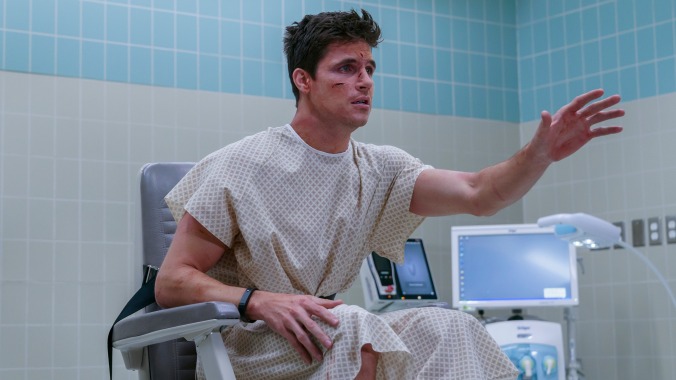Greg Daniels’ Upload is a bracingly dark sci-fi satire, but its human side lags behind


It’s difficult to talk about Greg Daniels’ new Amazon series Upload without invoking comparisons to the work of his old pal Michael Schur—specifically, The Good Place. Both shows come from alumni of some of the most popular sitcoms in recent TV history. Both traffic in a breed of dark absurdity that’s offset with moments of attempted human connection. And, most notably, both concern themselves primarily with the question of what happens to people after they die. But where The Good Place sets humanity’s ultimate fate in the lap of an inept, bumbling, and baffling cosmic bureaucracy, Upload puts the job of crafting our collective afterlives directly into human hands. It is, not surprisingly, an altogether darker and more hellish show.
Set in a semi-near future in which humanity had mastered—and then capitalized upon—the ability to “upload” the human mind into digital realms on the verge of death, Upload centers on the relationship between newly dead software developer Nathan Brown (Robbie Amell) and his personal customer service “angel,” Nora (Andy Allo). The fact that “heaven” requires the near-constant attention of a horde of call center employees is one of the first clues to how dark Daniels intends to take this vision of digital utopia: Pressured into accepting eternity in the ostensibly perfect computer world of Lakeview (by Horizon!), Nathan quickly realizes that escaping the mortal coil, and escaping the reach of capitalism, are two very separate things. It’s not long before he’s beset by the grim specters of all the irritants of modern online living: Microtransactions, unexpected hidden fees, and, of course, ubiquitous pop-up ads.
Upload is at its best when Daniels and his writers are exploring these grimmer implications of its central science-fiction conceit, whether that means diving into the support groups—and virtual reality sex suits—that spouses use to cope with their semi-absent wives and husbands, or an offhand comment about how Uploads are legally barred from having jobs. (Ostensibly because they’ve “earned their rest,” but in actuality because nobody wants to see their work taken by a low-income dead guy.) It’s some of the best “If this, then what else?” world-building featured on TV in some time, painting a picture of a society in which the most revolutionary technology imaginable hasn’t overthrown the social order, but rather been comfortably absorbed into it. Uploads themselves even have their own built-in class structure, from billionaires whose hotel room doors open onto vast and luxurious virtual estates, to the “two-gigs” housed in Lakeview’s basement, who have to resist the urge to think or emotionally react too hard, lest they burn through their meager allotment of data for the month and pathetically freeze in place.
It’s also here where Daniels’ wit is at its sharpest, with Upload’s darkest jokes—including the delayed reveal of what the “scanning” procedure actually entails—also being some of its best. The transitory nature of death in this universe allows the show’s writers to mine some very dark laughs out of moments of surprise violence or gore, and the fact that they’ve got William B. Davis, The X-Files’ own Smoking Man, on hand to lob some of the bleakest one-liners doesn’t hurt. But as bracing as Upload’s comedy can be, it’s the human side that often lets it down.
The relationship between Nathan and Nora is clearly intended as the emotional core of the entire show, a slow-burn romance that grows out of a mutual recognition of how flawed Lakeview really is. But while both Amell, and especially Allo, are charismatic enough, with chemistry aplenty, there’s a certain sense of routine to their interactions that underlies Upload’s inventiveness in most other respects. It doesn’t help that Nathan has a far more fascinating—and fraught—relationship with his actual girlfriend, Ingrid (Allegra Edwards), the woman who’s paying the tab for his stay in Lakeview. Unfortunately, the show’s willingness to explore the skewed power dynamic between its hero and his existential landlord often gets bogged down in an even more regrettable plot thread: The techno-thriller shenanigans surrounding its main character’s mysterious death.
It’s telling that Upload itself doesn’t seem to take this angle of its story terribly seriously, despite the fact that it takes up far too much of its run-time—especially as the season progresses. Characters poke fun at, dismiss, and blatantly lampshade the conspiracies surrounding the self-driving car crash that ushered Nathan into upload land, and yet the show also keeps devoting time and energy to investigating them. It betrays an unfortunate lack of confidence in the richness of the series’ world, falling back on the idea that there has to be some kind of “myth arc” active in order to keep watchers engaged. But Upload’s world, and the satire of our own that it steadily builds throughout its first season, is already more than potent enough to sustain the series without miring itself in cloak-and-dagger nonsense. Worse, the constant jerking effect these sequences exhibit on the series’ tone do it no favors.
Like Lakeview itself, Upload begins with an overwhelming self-assuredness, one that unfortunately starts to wither as familiarity steadily sets in. The show’s biggest flaw is that it’s trying to be three series, of widely varying quality, all at once: An excellent and imaginative sci-fi satire, an adequately sweet romantic comedy, and a fairly flat myth-arc thriller. The latter isn’t enough to drag the show down entirely, but it definitely distracts from the pitch-black belly laughs that show it at its best. Or, to fall back on those same Good Place comparisons: Schur’s afterlife opus executed a remarkable balancing act by keeping its cosmic scope and its personal stakes perfectly in check (give or take your personal feelings on the Chidi-Eleanor stuff, at least). Upload tries to do something similar, but with one of the sides of its equation so much stronger than the rest, it threatens, more than once, to topple into something that falls a fair sight short of paradise.